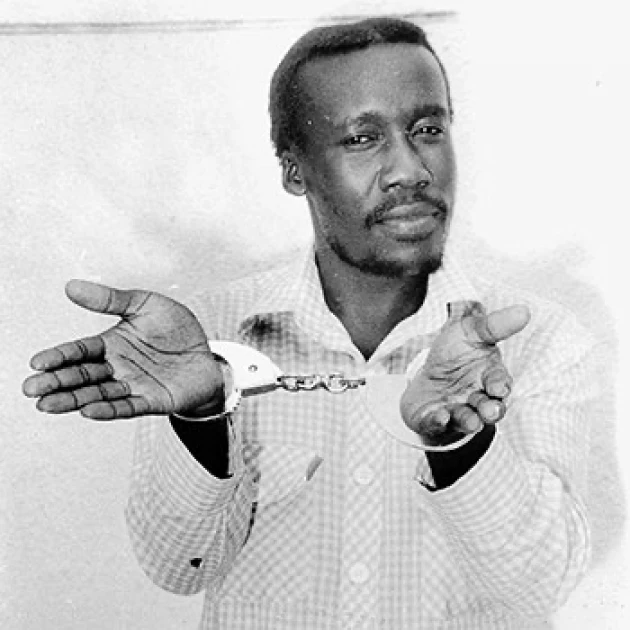A legacy of uncertainty: The unresolved fate of Kenya’s six-hour president

Hezekiah Ochuka Rabala, a Senior Private in the Kenya Air Force, is believed to have briefly led the country as president during a failed coup 37 years ago. Photo: File

Audio By Vocalize
In the quiet village of Nyakach Koguta in
Kisumu County lies the modest homestead of Hezekiah Ochuka Rabala, also known
as Awuor Onani. Once a Senior Private in the Kenya Air Force, Ochuka is
believed to have led Kenya as president for a mere six hours during an
attempted coup that still stirs controversy 37 years later.
The atmosphere in this secluded compound is a
mix of calm and tension, as questions linger about the fate of those involved
in the coup.
Ochuka’s cousin, Robert Akuro, sits in the
homestead surrounded by unused bricks and a mud-thatched house. With a sombre
expression, he recalls the story of the soldier who dared to challenge the late
President Daniel Moi’s regime.
Akuro’s face darkens as he tries to piece
together the events of that fateful day. He remembers August 1, 1982, the day
of the attempted coup, vividly.
"It was a Sunday morning," he
begins, "we were on the farm harvesting maize when we overheard a radio
announcement that the military had taken over the leadership of the country,"
Akura recalls.
At the time, the family had no idea that
their relative, Ochuka, was at the centre of the coup. They only knew that
he worked with the Air Force, but it never crossed their minds that he could be
the leader of such a bold move.
"As days went by, Ochuka’s name started
appearing in the newspapers as the coup leader," Akuro says, the shock
still evident in his voice.
The family’s concern grew when reports
surfaced that eleven soldiers had been killed for their involvement in the
coup. Ochuka’s father, Enoch Akuro, left their village of Nyabondo in Nyakach
for Nairobi, desperate to find his son. When he arrived, he was relieved to
learn that Ochuka was not among the dead.
"Many soldiers were killed, some with
guns still in their hands," Robert recounts. "But we later learned
that Ochuka, along with Oteyo Akumu and others, had escaped to Tanzania."
In Tanzania, the escapees sought asylum,
which complicated efforts to extradite them to Kenya.
"Plans to extradite Ochuka and his group
from Tanzania failed because they had sought asylum," Akuro explains.
Eventually, Ochuka was extradited to Kenya, detained, and charged with treason.
"While in the Kenyan prison, his sister,
Mary Odhiambo, his mother, his father and a lady named Linet Owira were the
only ones allowed to visit him," Akuro recalls.
After his sentencing, family visits became
rare, and Ochuka’s presence in their lives faded into the background.
"His case was handled by the court martial, and I vividly remember that the current Speaker of the National
Assembly, Moses Wetangula, was his lawyer," Akuro notes.
In 1987, the court ruled that Ochuka was to
be hanged. "I remember the day that news broke—it was devastating. Our
compound was filled with mourners, wailing in despair," Akuro says, the
memory still fresh in his mind.
Despite the grim sentence, the family never
saw Ochuka’s body, and according to Luo tradition, they held a ceremony to bury
something in his honour. However, government detectives disrupted the ceremony,
warning the family not to conduct any funeral rituals until they received
official confirmation of Ochuka’s death.
"The detectives asked who had brought
the news of Ochuka's death, and upon learning it was based on a rumour, they
ordered the gathering to be dispersed. Before leaving, they banned any
funeral-related ceremonies, insisting they could only be held after a thorough
investigation confirmed Ochuka's death and evidence, such as his belongings,
was provided—something that has yet to happen," Akuro laments.
The family’s quest for closure did not end
there. Akuro recalls how Ochuka’s mother once breached President Moi’s security
during his visit to Nyakach Girls, desperate to inquire about her son’s
whereabouts. She was met with a brutal response from the security forces, a
memory that haunted her until her death. "She died a sad and disturbed
woman," Akuro says, his voice heavy with sorrow.
What troubles the family most is the silence
of Ochuka’s former lawyer, Moses Wetangula.
"It’s been over thirty years, and we’ve
never received any tangible evidence confirming Ochuka’s death," Akuro
says.
"The worst part is that Wetangula is
still alive. How can he know nothing about the client he represented? We have
lived all these years in hope, but we still don’t know if Ochuka is dead or
alive."
Even after decades, the family holds on to
the hope that one day the government will reveal the truth about their son,
whether he is dead or still somewhere out there.


Leave a Comment